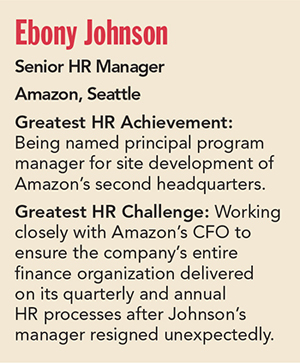This article accompanies Agents of Change.
When the manager of Ebony Johnson’s HR finance team at Amazon unexpectedly resigned in late 2015, just before the company’s busiest time of the year, it created a unique opportunity for Johnson to demonstrate her ability to operate calmly under intense pressure.
Over the next financial quarter, Johnson stepped up and worked closely with Amazon CFO Brian Olsavsky to make sure the retailer behemoth’s entire finance organization delivered on its quarterly and annual HR processes, including managing executive-level organization analysis, delivering compensation consultation and analysis, and guidiung the leadership team through talent meetings at the top level.
“When Ebony helped me bridge the leadership gap with our CFO,” says Darcie Henry, Amazon’s vice president of HR, “I witnessed a star rising.”
Olsavsky was impressed enough with Johnson’s work that he directly supported her eventual promotion. That, in turn, led to her current position as principal program manager for site development of Amazon’s much-discussed second headquarters. In that role, she works closely with top company leadership and is responsible for building out and developing people operations for the new site.
“I’m incredibly lucky,” she says. “My role is to look at the current and future talent pipeline of our new corporate footprint and work with new communities to collaborate effectively.”
Johnson joined the Seattle-based company in 2007 as part of Amazon’s HR leadership-development program after receiving an MBA from Cornell University’s S.C. Johnson Graduate School of Management, which followed her bachelor’s degree in economics. Before joining Amazon, though, she served as an officer in the U.S. Navy from 2001 to 2005, where she says she learned several vital lessons that she’s carried with her into the civilian working world.
The first, she says, was that her experience in the Navy in a post-9/11 world helped her to always keep things in perspective.
“The military is life and death,” she says, “and the business world, quite frankly, is not. So, while I take my work seriously, I don’t take myself seriously. I always try to be approachable.”
It also galvanized her for the stressful situations she would soon face while working for one of the country’s most innovative brands.
“[Being in the military] helped me learn how to break down problems, and that’s highly applicable to the work I do here,” she says, adding her education also helped her contribute to the company’s vibrant whitepaper culture.
Finally, she says, her experience taught her to value people, a key trait for HR leaders.
“Regardless of the circumstances,” she says, “you need to treat people with respect.”
During her 10 years at Amazon, Johnson has worked in almost every HR function, from operations to central corporate functions to front-line HR-employee support, which Henry says “helped [Johnson] build an incredibly vast knowledge of the HR universe.”
To wit: When Amazon launched its physical retail stores, it faced the challenge of incorporating an employee population that was disconnected from its own physical presence into its daily processes. One area of opportunity emerged with Connections, a program designed to change how employees share feedback and help managers improve based on data.
Johnson worked with the central Connections team as well as technical program managers, hardware and software developers, and team members in the retail stores to build an offline solution for associates to answer a Connections question every day.
“Ebony literally built something out of nothing and would not take ‘No’ for an answer,” Henry says. “She drove relentlessly to do what was right for the retail associates, and her work is part of day-to-day [operations] in these stores today. Her work in this space set the bar for the role across the company, and she established herself as a critical part of the business leadership team.”
Johnson says her favorite part about working for Amazon is that “it’s not a hierarchical work environment. Everyone is an owner and leader here. I like that we expect each other to learn from and to push each other.”
Amazon’s mission to ensure a positive experience for its end users is another reason for her satisfaction.
“Our focus on what will best serve the customer and fix pain points is really something energizing to me,” she says.
Johnson also channels her passion for people into her membership in Amazon’s Black Employee Network, which is dedicated to recruiting, retaining and empowering black employees to build “a stronger company through a more diverse workforce.”
She also volunteers for Community for Youth, which combines one-on-one mentorship with directed workshops and community-building activities to help underserved teens from the most vulnerable South Seattle high schools grow and thrive.
Henry recalls that watching Johnson “walk through complex compensation analytics with the CFO, pushing back on his challenges with data and logic” made her realize that Johnson was one of the highest-potential and most understated HR leaders on her team.
“Her simultaneous passion for the employee and ability to consider the overall business impact is on a scale I have rarely witnessed,” she says, “and never at her stage of development.”
As far as future career plans go, Johnson will only say that she sees herself “in a role doing meaningful work for both the company I work for and the community it operates in.”
But Henry is more direct: “My vision for Ebony is that she will be in a head of HR or business role in her future. She has unlimited potential.”

